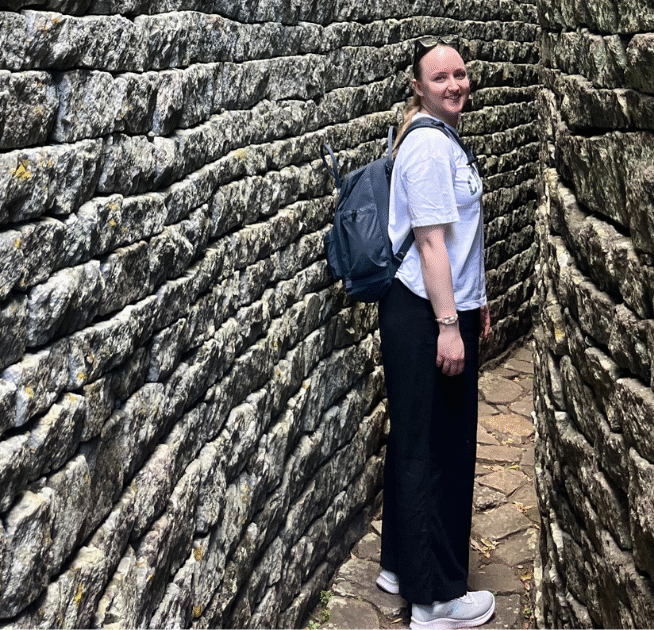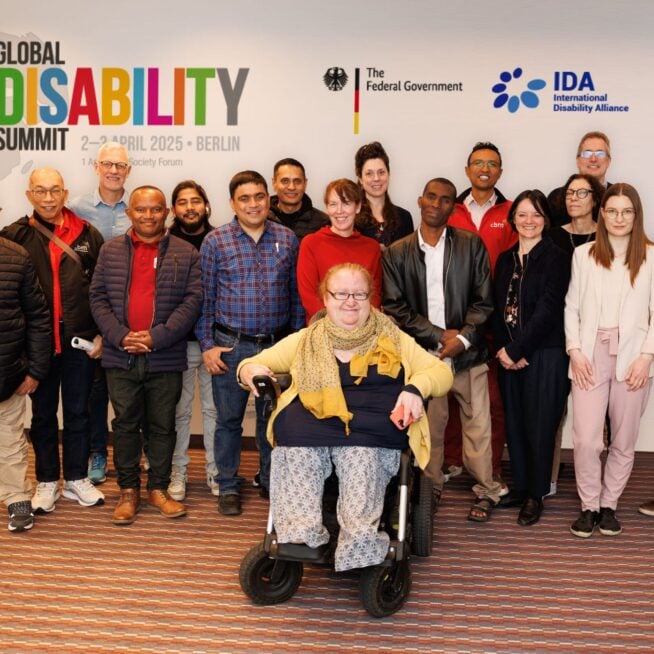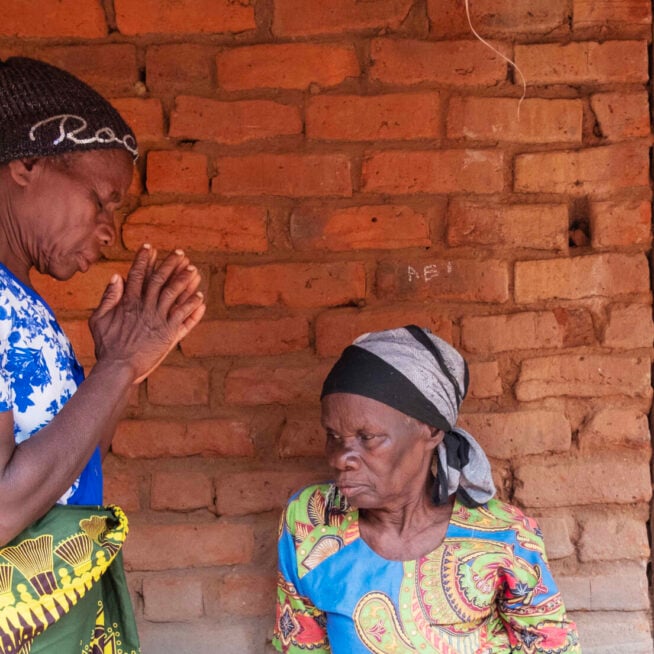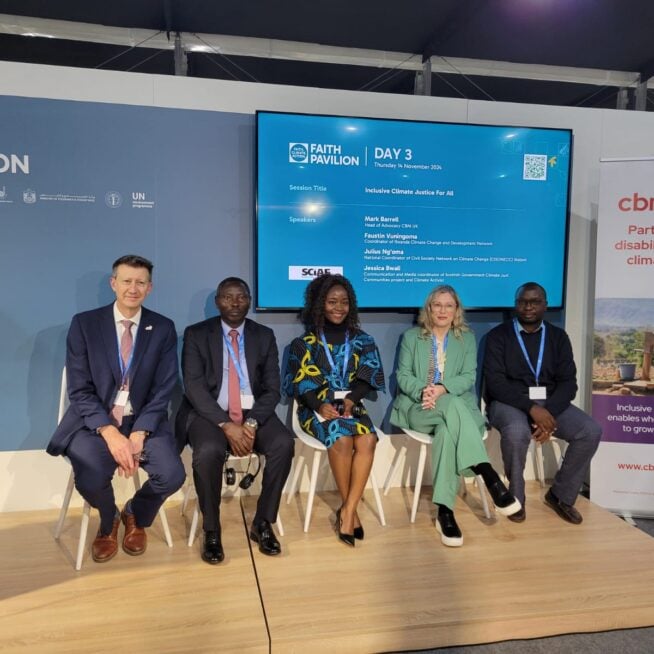Want to transform lives with us? Stay in touch and hear about our news, activities and appeals by email!
It could have been me: Anne Wafula Strike responds to BBC3 documentary “Worst Place to be Disabled?”
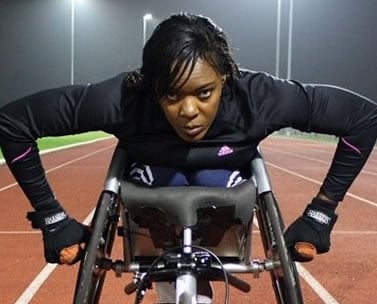
CBM Ambassador Anne Wafula Strike gives a personal response to Worst Place to be Disabled? (BBC Website – open link in new tab), a documentary about disability in Ghana shown as part of BBC3’s recent Defying the Label season.
I sat with my son, overwhelmed with tears, as I watched a so-called “healer” talk about how he kills children with disability, because they have a curse. We were watching “Worst Place to be Disabled”, a BBC 3 documentary in which British journalist Sophie Morgan, a wheelchair user, uncovers the stories of abuse and discrimination faced by people with disabilities in Ghana.
When I was growing up in Kenya this was what was meant to happen to me. My parents were told to feed me poison, abandon me and leave me to die. If my mother and father had listened to them, then I wouldn’t be here to tell the story today.
Our neighbours were afraid that my “curse”, in fact paralysis caused by polio, would spread to others, would affect the babies of pregnant mothers. If my parents refused to “send me back where I came from”, they threatened to burn our house down. So our family had to flee the village.
It saddens me to see how families are still going through the same thing even now. That there is still such prejudice, such lack of knowledge and education; even now, people believe that having a disabled child is a curse, caused by some fault of their own. And worst of all, that people can murder a child without anyone lifting an eyebrow.
But sadly I know that serious abuse towards people with disability is still happening in Kenya, even in the village I was bought up in. I know of cases where disabled children have been locked up in animal pens, viewed as a liability, their disability something shameful. Children with autism or intellectual disabilities locked away because they “mae too much noise”. When I was in Haiti filming footage about disability, we were spat on in the street. It underlined for me to me that the views held by society are much more disabling than my own impairment.
The stories of horrendous abuse and discrimination experienced by disabled people around the world need to be told, which is why I am so glad that Sophie Morgan and BBC 3 were able to make this documentary. But now it’s time for action – the Government of Ghana should be ensuring that murderers and criminals are detained and that local people are educated about disability; the UN should be investigating these breaches of the UN Convention on the Rights of People with Disabilities.
It also struck me that the documentary did not tell the whole story. As with so much coverage of Africa, nearly all of the focus was on the negative, the most extreme examples. Understandable, perhaps, in this type of documentary, and undoubtedly true – but not the whole truth. We did see a couple of the organisations doing good work in Ghana, for example the Orthopaedic Centre where the child Blessing had her prosthetic leg fitted. But there are also many more positive stories about disability in Ghana that were not told – inspiring Paralympians, great work being done by NGOs, self-help groups which enable people with disabilities to challenge negative attitudes, like the ones supported by CBM.
There’s so much amazing work being doing in Africa by and for people with disabilities, including by my Olympia-Wafula Foundation and NGOs like AbleChild Africa and CBM, to provide practical support and change attitudes in some of the poorest communities.
While we must uncover and talk about the atrocities that the documentary uncovered, we also shouldn’t ignore those people with disabilities who are running businesses, raising children, being teachers, campaigning for their rights. We need to show the stories of those brave and loving parents who are supporting their disabled children in spite of the stigma that surrounds them, as my mother and father supported me.
I’d like to see a follow up documentary exploring the possible solutions to this. I’d like to sit down with these families who would be prepared to abandon their children or have them killed, to find out what drove them to do this. Is it their neighbours, tradition, lack of knowledge, fear?
Most of all, I’d like to tell those families my story and show them what a girl from a village in Kenya can achieve. They need to understand that they can still have dreams for a child who is disabled. They could be killing a future Paralympian, a professor, a teacher, a parent, the next President of Ghana. This is the message we need to get across to families and communities, and to disabled people themselves.
The stories we saw from Ghana are shocking, this type of abuse should never be allowed to happen in any part of the world. But we also need to remember that disabled people face prejudice and barriers in every country, including our own. In the UK, benefits cuts are causing great suffering for disabled people. A UK politician has stated that children who are likely to be born with autism or other disabilities should be aborted. So children with disabilities don’t even have the right to be born. Stigma is still real, even here with the NHS and education system, we can’t build a level playing field. So how far can we judge parents of children living in poverty, with no free wheelchairs or medical care, no social security, no free state education?
I’m very glad that this documentary was made – Sophie Morgan and the documentary makers did a fantastic job – but I hope that it is the beginning and not the end of discussion about disability in Africa. We need more documentaries, more discussion and more action. Attitudes to disability can and must change, and people in the UK can help that happen by supporting organisations like CBM, AbleChild Africa or the Olympia-Wafula Foundation. But most of all, we need to show families in Ghana – and across the world – that children with disabilities are not a curse or a liability, that they can grow up to be mothers, teachers, business owners or paralympians. That is the most important story that we need to tell.
Anne Wafula Strike is a Paralympic wheelchair-racer, disability-rights campaigner and author. Originally from Kenya, she is a CBM Ambassador and founder of the Olympia-Wafula Foundation.

